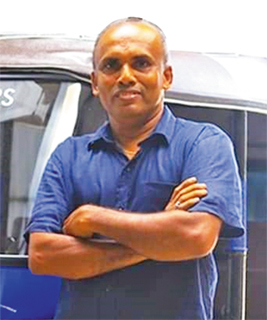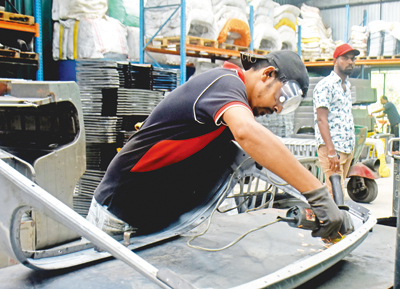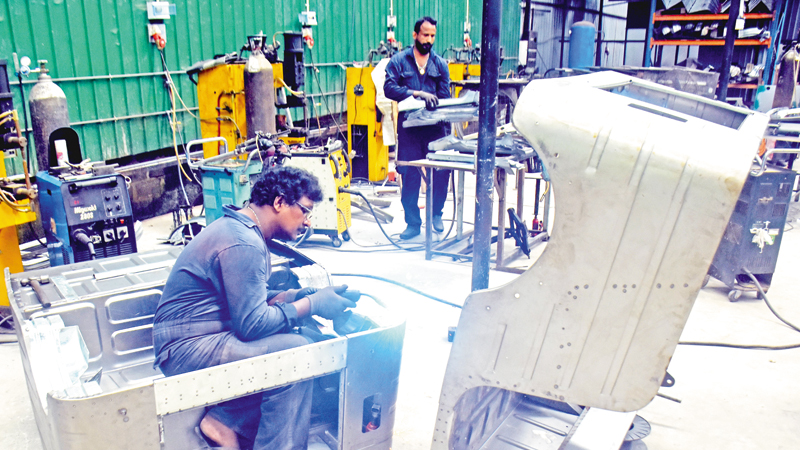Indian three-wheelers are imported to Sri Lanka and unloaded from containers in the Madapatha area. However, a surprising sight awaited us when we observed an electric three-wheeler, manufactured in Sri Lanka, being loaded into a container.

H. B. Milton with the locally produced three-wheeler
Pix: Gayan Pushpika and Sulochana Gamage
This noteworthy event occurred near the Milton Motors three-wheeler manufacturing facility in Siddamulla. The introduction of Milton Motors was initially featured in the Silumina, our sister newspaper.
Entrepreneur H.B. Milton said that these three-wheelers have been specifically ordered as samples to be sent to Japan. According to Milton, these three-wheelers are intended for various purposes in Japan, including use within hospital systems, container yards, and for commuting from high-speed electric trains to bus stops, rather than public transport.
Milton has also turned out four additional electric three-wheelers to be shipped to Korea. This opportunity came after an article about Sri Lanka’s electric three-wheeler manufacturers was published in the Sunday Observer newspaper. Subsequently, Milton had the opportunity to visit Korea and study electric three-wheeler technology in the Korean market.
According to Milton, the primary challenge he faces is sourcing high-quality stainless zinc sheet parts essential for constructing the three-wheelers. Additionally, a substantial investment is necessary to procure the raw materials for other metal components, rubber parts, windshields, and plastic elements.
Milton said that Vietnam and Kenya have extended invitations to him to initiate electric three-wheeler manufacturing facilities in their countries. He also notes that there is a growing demand for electric three-wheelers from Japan and South Korea, primarily due to the electric motors and rechargeable batteries produced in those nations.
However, the most significant hurdle faced is the absence of a legal framework necessary for the registration of electric three-wheelers, which has not yet been established through the Department of Motor Traffic.
 Milton’s factory began its operations with a bank loan of Rs. 70 million, and it has grown significantly without any Government assistance. Financial support for bank loans was extended to Milton by institutions such as the Bank of Ceylon, Pan Asia Bank, and Vallibel Finance.
Milton’s factory began its operations with a bank loan of Rs. 70 million, and it has grown significantly without any Government assistance. Financial support for bank loans was extended to Milton by institutions such as the Bank of Ceylon, Pan Asia Bank, and Vallibel Finance.
Advantage
The body of an imported three-wheeler typically Vietnam and Kenya have extended invitations around Rs 150,000, whereas the locally manufactured Milton three-wheelers are priced at Rs 80,000. One notable advantage of Sri Lankan products is their resistance to rust, distinguishing them from imported products.
According to the 2021 Central Bank Report, the total number of registered three-wheelers in Sri Lanka from 2012 to 2021 stands at 534,351. “We can manufacture the parts locally.
The current issue lies in the escalating prices of raw materials, driven by a shortage of foreign currency. As a company policy, we do not compromise on using low-quality or substandard raw materials.
I have submitted a written request to the Governor of the Central Bank of Sri Lanka (CBSL) Dr. Nandalal Weerasinghe concerning this matter,” Milton said.
One practical approach through which the Central Bank can support the growth of the domestic electric three-wheeler industry is to release loans for electric three-wheeler projects in Sri Lanka, as approved by the Industrial Development Board (IDB), at a subsidised interest rate of less than ten percent from both public and private banks under the Banking Supervision Department of the CBSL.
Milton recommends implementing this strategy to facilitate the industry’s development.
Milton’s current electric three-wheeler has a range of 100 km on a 4-hour charge, which is generally enough for a city run. However, with the newly tested battery, the range extends to 200 km when charged for 4 hours.

The metre that shows the status
of the battery
He said, “Converting a petrol three-wheeler into an electric one will cost approximately Rs. 1.2 million. We anticipate selling a brand new electric three-wheeler for just Rs. 1.8 million”. In contrast, an imported electric car is likely to cost Rs.5-6 million at least.
Milton said the advantages of electric three-wheelers, stating, “There is no need for engine oil and no requirement for petrol. In case of engine issues, there is no expense for engine repairs. Instead, you only need to visit a garage for brake adjustments, which costs just Rs. 3 per kilometre.”
Intervention
He has also received an invitation to move his factory from Sri Lanka to Tanzania. Milton expresses a deep love for Sri Lanka, stating, “I love Sri Lanka more than any country in the world.” He believes that with the intervention of the President and support from the CBSL, along with the provision of essential raw materials for production, Sri Lanka can export these products not only to Tanzania but also to many other countries, opening significant opportunities for international trade and business.
Milton expresses frustration with the state of affairs in the country, stating, “Everything is politicised in this country.
There are scams everywhere. People who could work for the betterment of the country often choose not to do so.
Instead, there is a prevalent focus on importing goods from abroad and selling them for a commission.
This raises concerns about how long we will have to wait to see a return on the substantial investments made in such businesses,” he said.
Translated by Maneshka Borham









